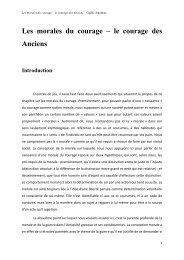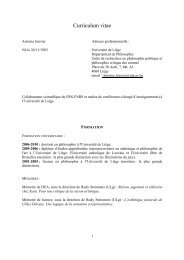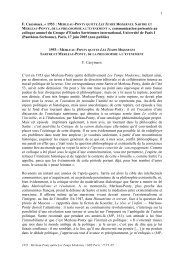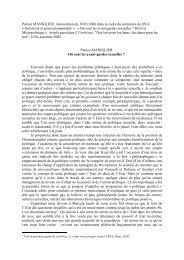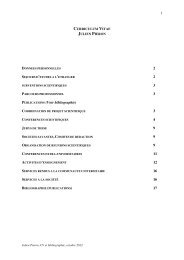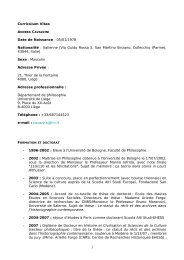Subjectivations politiques et économie des savoirs - Service de ...
Subjectivations politiques et économie des savoirs - Service de ...
Subjectivations politiques et économie des savoirs - Service de ...
Create successful ePaper yourself
Turn your PDF publications into a flip-book with our unique Google optimized e-Paper software.
– Revue <strong>de</strong> philosophie politique <strong>de</strong> l’ULg – N°5 – Mai 2013 – p. 130<br />
the object of most men’s strongest and most frequent longing. Because of the<br />
innate <strong>de</strong>pravity of men and their misdirected education, money has the power<br />
to produce in them a million cravings that are impossible to satisfy – all<br />
centering on the endless acquisition of wealth. […] The best and the noblest<br />
policy for all cities to follow is to tell the truth about wealth, namely that it exists<br />
to serve the body, just as the body should be the servant of the soul. (870a)<br />
Predictably then, a good <strong>de</strong>al of Plato’s energy is spent, in the Laws, on <strong>de</strong>vising a s<strong>et</strong><br />
of laws, « charms for the souls » (659e) and institutions which will curb the worship of<br />
money.<br />
I have argued thus far that part of the reason for the scholarly neglect of the virtue of<br />
mo<strong>de</strong>ration may be because it has been unduly associated with asc<strong>et</strong>icism. L<strong>et</strong> me<br />
now suggest that Platonic sophrosyne may also be un<strong>de</strong>rstudied because it tends to be<br />
equated with blind obedience and an unquestioning respect for the status quo. For<br />
many scholars, sophrosyne is essentially a convenient tool in the hands of rulers to g<strong>et</strong><br />
the submission of the masses. Such a skeptical reading of mo<strong>de</strong>ration is offered by<br />
Neal Wood, who writes:<br />
The operating principle of [the Republic’s] i<strong>de</strong>al socio-political organization,<br />
hinted at by Socrates in the Charmi<strong><strong>de</strong>s</strong> as the principle of temperance, would<br />
be each man tending to his own business, no one interfering with another’s’<br />
function in the hierarchy… All of this translates into the axiom that the superior<br />
should dominate the inferior who must submit to their domination, just as soul<br />
should command body, and body should obey soul. In both cases the<br />
relationships are conceived of as existing by nature and hence by right. The<br />
Socratic i<strong>de</strong>al contains a built-in bias for the upper classes of his age 31 .<br />
Albeit from a different angle, other scholars have also suggested that mo<strong>de</strong>ration is an<br />
inherently conservative virtue or that it necessarily leads to a conservative politics –<br />
one can think here of Dana Villa, Leo Strauss and Hannah Arendt. D. Villa refers to<br />
mo<strong>de</strong>ration as « the’ classical-conservative virtue 32 , Strauss speaks of it in terms of an<br />
« unquestioning submission to the wisdom of the law 33 », and H. Arendt <strong><strong>de</strong>s</strong>cribes<br />
Greek sophrosyne as a « keeping within bounds 34 ». Wh<strong>et</strong>her or not this apparently<br />
conservative virtue is <strong><strong>de</strong>s</strong>irable is not, however, a matter of consensus: if D. Villa and<br />
31<br />
32<br />
33<br />
34<br />
N. Wood, « Socrates as political partisan », Canadian Journal of Political Science, VII(1), 1974, p. 19;<br />
my italics.<br />
D. Villa, « The Philosopher versus the Citizen », Political Theory, 26(2), 1998, p. 148.<br />
L. Strauss, City and Man, p. 214. My italics.<br />
H. Arendt, The Human Condition, p. 191.



